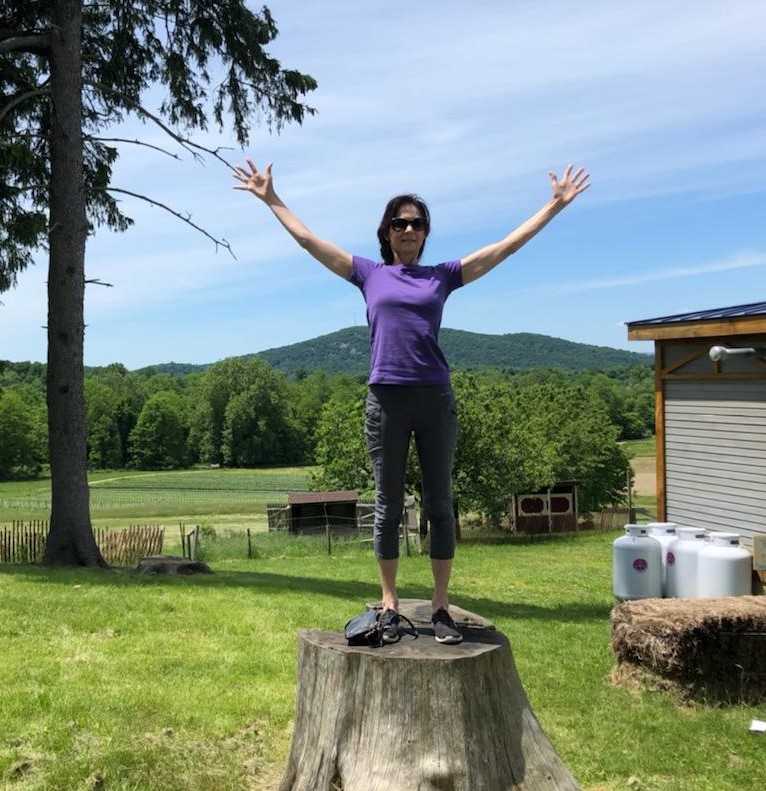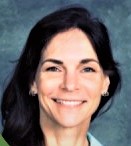“Anorexia: Difficult, Layered, yet Winnable”
Michele is a vibrant and successful woman who has enjoyed a fulfilling career in healthcare and nutrition. She was diagnosed with Anorexia Nervosa in 1981. At the time, little was known about the disorder, and her treatment was limited to the technology of the day. Michele notes, “Ignorance of the condition was very common.”
Michele learned about The United Brain Association while researching for her soon to be published manuscript, a memoir/self-help guide about Anorexia, written to share her experiences to help others affected by Anorexia. While researching her manuscript, Michele obtained her medical records and compared her past treatment to present-day therapies.
Michele was on her North PA 8th Grade basketball team in 1979. The team has just undergone pre-season physicals with the school nurse. At home with friends that afternoon, they discussed their heights and weights. Michele mentioned she was 5’-8” tall and 142 lbs; her mother entered the room and chimed in, “You’re fat.” Later in 1979, her family moved across the country with her father’s job. They returned to North PA in 1980, and Michele began losing weight in August 1980. Over the next several months, her weight fell to 100 pounds – a 33 percent drop. She saw herself as a skeleton, but couldn’t stop starving herself. During March 1981, her mother took her to the family physician for a checkup. Her doctor had her stand up and hold her arms out to her sides. After a brief assessment, he instructed M’s mother to take her to the hospital immediately. She was admitted to a local hospital for (2) weeks and then transferred for (3) months to a Mental Health Unit (MHU) for observation and treatment of her Anorexia. Michele mentions her family was unsupportive during this time, primarily at the direction of her mother; her mother refused to visit, her father visited infrequently, and her (2) brothers were not permitted to see her. In reflecting, Michele believes these behaviors were due to ignorance. Even today, there are myths surrounding Anorexia; some allege the person suffering is just doing it to get attention and can stop anytime they choose.
Michele says, “Anorexia is vicious, seductive, insidious, and relentless.”
Michele returned home from the MHU in the summer of 1981. Despite the warm, sunny weather, she found herself very lonely and isolated. Her stay in the MHU taught her many lessons from the staff and her fellow patients. She was given warm and caring advice from many staff counselors and learned to rely on her inner strengths. Her stay also taught her self-awareness and accountability for herself and her actions. As is common, she was diagnosed with (2) comorbidities often associated with Anorexia Nervosa: Depression and OCD. She was treated for her Depression with pharmaceuticals; as her Depression was resolved, she began to overcome her Anorexia. She recalls thinking to herself, “I have to do this! This is my body and my brain.” She found she had created an internal voice for her Anorexia – a voice befitting the “Monster Bitch” Anorexia had become.
When asked about the treatments she was prescribed, Michele mentioned:
- Anti-depressants – they helped her feel better. She started having more positive thoughts, which were reinforced by her social workers’ continued support
- Mental Health Unit admission and counseling:
- Each day was highly structured and full of activities – an idle mind can wander
- Social workers were caring and helpful – they invested their time in her and taught her about kindness, and instilled in her the fact, “It is not your fault.”
- She began to feel her depression lifting as a result of the social worker’s care and kindness

For over four decades, Michele tried to bury her experiences with Anorexia, making herself believe it never happened – mainly because of the nightmare it had become, coupled with current body-shaming trends and the stigmas often associated with a mental health diagnosis. These circumstances made seeking treatment for Anorexia very difficult.
Michele’s mother died in Sept 2017, and her father followed in Aug 2019. During this period, her memories and subsequent emotions about her Anorexia “bubbled out.” She felt she needed to tell others about her experiences; she did so in the form of her manuscript. Looking back on her parents and their dealings with her diagnosis, she realized they were blind to her condition. They never apologized for their cold reception of her diagnosis, and there were unsupportive of her treatments and attempts to overcome her problems.
Michele began losing weight during her parent’s passing; she lost 20 lbs. and was down to 130 lbs. Her family and friends commented on her weight loss; this led her to evaluate her feelings: “was it grief, a relapse, or some combination of the two? What does the brain dig up in its archives when parents die?” Michele took charge by engaging in healthy nutrition and exercise. She says, “Once you recover, do you really recover?” She realized she needed to be “Hyper-Aware” of herself, and she needed to help herself as her main priority. She learned Yoga, finding her ability to strengthen her Mind and Body, helping to keep her on the right track regarding her self-esteem and body weight.
Michele is currently married and has stepchildren. When she was in her 30s, she contemplated starting a family but hesitated because she was concerned about having a daughter who may be by anorexia, as studies show anorexia is genetic in 50-80% of cases. She decided not to have children and has since been rewarded with her husband and his children.

Michele mentions the concept of “Residue.” She notes her family has a history of Depression
She also says, “When I compare life’s obstacles and challenges that I’ve experienced in these four decades, nothing else even comes close to Anorexia.” Michele chose to be strong; she could have succumbed to the disorder but was able to reach deep within herself and climb up out of the grave.
Michele mentions these positive actions to address her negative talk tracks:
- Yoga
- Talking with her loved ones – especially her family.
- Enjoying nature, which is exceptionally engaging in Phoenix
- Journaling and writing
- Indulging in her favorite dessert – carrot cake!
Michele observes, “Too much time spent dwelling on the past leads to Depression, and too much time wondering/worrying about the future leads to Anxiety.”
Michele mentions her mother pushed her out of her home when she was 19. She was forced to make her way in the world and was able to connect with her grandmother. M found tremendous support from her grandmother. She received constant encouragement and found her to be a strong role model.
Michele’s strongest advice to anyone diagnosed with Anorexia is, “It’s not your fault.” She has several takeaways to support this advice:
- You didn’t cause your Anorexia.
- It is nothing you did or didn’t do
- This is as serious as it gets
- Talk openly with others about your condition
- Anorexia has taken over you – GET HELP! Your life is being hijacked, and your body and mind are suffering. When your body and brain are starving, they can’t function properly. You can’t make good decisions for yourself. Do your best to trust those around you who are trying to help you. You want to resist help and keep with the rituals. It is your control. But it’s hurting you. Try your hardest to let others help you.
- You can survive this – but you must take control
- Anorexia does not discriminate. Cases are rising in women and men across all ethnicities, backgrounds, and lifestyles.
When asked what Anorexia has kept her from accomplishing, she reflects:
- Her diagnosis and treatment took over 2 years, from the formative ages of 15 to 17. This prevented her from participating in activities such as dating, attending parties, and other social activities.
- Michele loved food as a kid – she used it as fuel. But unfortunately, her history of Anorexia has caused her to look at food differently. Although, she notes, “Most women have issues with food,” her issues became crippling and life-threatening.

As a survivor, Michele takes pride in her many accomplishments:
- A successful career in the health industry
- Great relationships with family and friends
- Confidence to pursue creative endeavors – author, artist, reiki practitioner
Do you or someone you love have a Brain Story to share? We’d love to feature you! Head over to our Brain Story page to learn how to submit your Brain Story. To learn more about our mission to find a cure for brain and mental health-related issues and disorders worldwide, please visit our website at The United Brain Association. If you’d like to receive updates, news, scheduled events, or more information about our ongoing donor-funded research projects, sign up for our email newsletter by clicking here. Together we can find a cure.
You Are Not Alone
For you or a loved one to be diagnosed with a brain or mental health-related illness or disorder is overwhelming, and leads to a quest for support and answers to important questions. UBA has built a safe, caring and compassionate community for you to share your journey, connect with others in similar situations, learn about breakthroughs, and to simply find comfort.

Make a Donation, Make a Difference
We have a close relationship with researchers working on an array of brain and mental health-related issues and disorders. We keep abreast with cutting-edge research projects and fund those with the greatest insight and promise. Please donate generously today; help make a difference for your loved ones, now and in their future.
The United Brain Association – No Mind Left Behind




